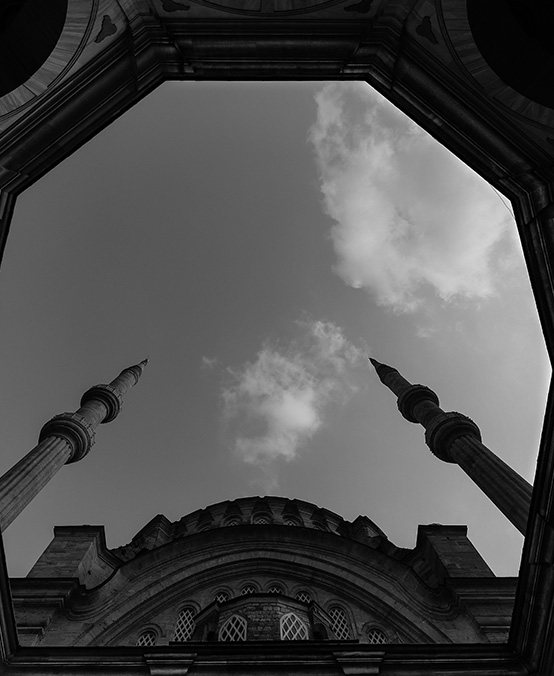An aspect of belief in Allah and the Last Day is that the believers will see their Lord on the Day of Judgement, with their own eyes, even though they do not encompass Him with their sight. They will see Him at two points: The first will be at the time of reckoning and the second will be after they have been admitted into heaven.
Allah says: Some faces will on that day be radiant with happiness, looking towards their Lord.
They recline upon their couches and look [around them]’.
Allah also says: ‘For those who do good there is a good reward, and more besides’.
.jpg)
.jpg)
The Prophet explained that the expression ‘more besides’ means that believers will be looking at Allah’s face.
When he looked at the full moon, the Prophet said to his companions: "You shall see your Lord like you see this moon. You shall not be obstructed from seeing Him".
Two groups err in this respect. They are:
a.Those who deny Allah's attributes: al-Jahmiyyah, al-Mu[tazilah and whoever agrees with them such as the Shia and al-Ibadiyyah. These deny that the be- lievers will see their Lord, citing in support what Allah said to Moses: "You shall not see Me".
.jpg)
They also cite the verse that says: "No power of vision can encompass Him".
To refute their argument we say that Allah’s words to Moses, ‘You shall not see Me’, refer to this present life, as Moses had requested, and this negation is not nec- essarily absolute. Moreover, the other verse negates ‘encompassing Him’, but this does not mean a negation of seeing. It is possible that we see something without encompassing it, as we see the sun, the moon, a mountain, etc. Moreover, there are several Qur’anic and Hadith texts that confirm that believers will see their Lord.
b.The superstitious Sufis and other deviant groups. These exaggerate the possibil- ity of seeing Allah and allege that it takes place in this life, as their leaders ex- perience it, and narrate fabricated hadiths to confirm their views. However, the Prophet says: "No power of vision can encompass Him’.‘Learn that you shall not see your Lord until after you have died".


1.To believe, or to have faith [iman], involves words and actions. The words are mental and verbal and the actions involve the mind, the tongue and the organs of the body.
a. Mental words mean belief, conviction and acceptance.
b. Verbal words mean to state the declaration of belief in Allah’s oneness and Mu- hammad’s message.
c. Mental actions include intent and will, such as the love and fear of Allah, as well as placing one’s hope and trust in Him.
d. The tongue’s action refers to what one says of glorifying Allah, supplication and recitation of the Qur’an.
e. The action of the body’s organs include their movement as one performs physi- cal worship.


Allah says: "True believers are only those whose hearts are filled with awe when- ever Allah is mentioned, and whose faith is strengthened whenever His revelations are recited to them. In their Lord do they place their trust. They attend regularly to their prayers and spend in charity some of what We have provided them with. It is those who are truly believers. They shall be given high ranks with their Lord, and forgiveness of sins and generous provisions".
"True believers are only those who have believed in Allah and His messenger, and never then entertained any doubt, and who strive hard in Allah's cause with their possessions and their lives. Those are the ones who are true to their word".
The Prophet says: "Faith [iman] has some-and-seventy or some-and-sixty branches. The best of these is the statement, “there is no deity other than Allah”, and the lowest is to remove harmful objects from people’s way. Modesty is a branch of faith".64
2.When faith is mentioned separately, it is synonymous with Islam being men- tioned separately. Each of these words means the Islamic faith in total. When they are mentioned together, faith refers to mental conviction and Islam refers to physi- cal action. Thus, every believer is a Muslim but not every Muslim is a believer. Allah says: "The Bedouins say: “We have attained to faith.” Say [to them]: “Be- lievers you are not. Rather say, ‘We have submitted ourselves’”, for true faith has not entered your hearts. But if you truly pay heed to Allah and His messenger, He will let nothing of your deeds go to waste. Allah is indeed much forgiving, ever merciful”.
3. Faith [iman] may increase or decrease. It increases with better knowledge of Allah, contemplation of His universal signs, reflection on the Qur’an, doing what He orders and refraining from what He prohibits. It decreases with the opposites of these, such as ignorance about Allah, ignoring His universal signs and the Qur’an, neglecting His orders and committing what He prohibits. Allah says: "Whenever His revelations are recited to them, their faith is increased".
"It certainly strengthens the believers in their faith, and so they rejoice".
"It is He who sent down tranquillity into the hearts of the believers, so that they may grow more firm in their faith".

4. Some aspects of faith are more important than others, as the Prophet says: "Faith [iman] has some-and-seventy or some-and-sixty branches. The best of these is the statement, “there is no deity other than Allah”, and the lowest is to remove harmful objects from people’s way. Modesty is a branch of faith".
5. The believers are of different ranks, with some more perfect in their faith than others, as Allah says: "We have given this Book to such of Our servants as We choose: among them are some who wrong their own souls, some who follow a middle course; and some who, by Allah's leave, are foremost in deeds of goodness. That is the greatest favour".
The Prophet says: "The most perfect of believ- ers in their faith are the ones with the best manners".
A person who makes the declaration of faith, in both its parts and believing in what they imply, and commits himself to its requirements meets the essentials of faith. The one who performs the duties of faith and refrains from what is prohibited fulfils one’s duties, and the one who performs the duties and the recommended practices while refraining from what is prohibited and what is discouraged is one of complete faith [iman].
6. Adding a phrase of exception to faith, as in the case of one saying, ‘I am a be- liever, Allah willing’, may reveal one of three situations:
i. The person saying it is in some doubt about faith. In this case the exception is prohibited and expresses disbelief, because faith requires firm decision.
ii. A person says this in order to guard against self-praise and pretence to complete or perfect iman. In this case, the exception is a duty.
iii. A person says it merely as a blessed expression that everything is subject to Allah's will. In this case, the exception is permissible.

.jpg)
7.The status of faith [iman] is not negated by committing sins, even the major ones. Faith remains but is deficient. A person who commits a major sin is a believer but his faith is deficient, and he is a transgressor because of what he has committed. He is not ruled as an unbeliever in this present life, and he is not punished in hell forever. He is subject to Allah's will. Allah may bestow His grace on him and pardon him, admitting him into heaven, or He may punish him as suits his sins and eventually admit him into heaven. Alternatively, his punishment may be less than his sin, and he is discharged from hell through the intercession of those Allah allows to intercede, or by Allah's mercy. Allah says: "For a certainty, Allah does not forgive that partners are associated with Him. He forgives any lesser sin to whomever He wills. He who associates partners with Allah contrives an awesome sin indeed".
.jpg)
Another version also related by al-Bukhari substitutes ‘of faith’ for ‘of goodness’ in all three cases.
a. The warning upholders who maintain that Allah's warnings will be enforced. They deny that intercession will apply to those who commit major sins even though they believe in Allah's oneness. These are of two types:
6. Adding a phrase of exception to faith, as in the case of one saying, ‘I am a be- liever, Allah willing’, may reveal one of three situations:
i. Al-Khawarij, who say that the one who commits a major sin removes himself from faith and becomes an unbeliever. As such, he is an unbeliever in this life and stays in hell forever.
ii. Al-Mu[tazilah, who say that the one who commits a major sin removes himself from faith but does not become an unbeliever. He is in a position in-between, nei- ther a believer nor an unbeliever, yet he stays in hell forever.
First, Allah describes a person who commits a major sin in this life as a believer and retains his status of brotherhood with other believers. He says: "Believers, just retribution is prescribed for you in cases of killing: a free man for a free man, a slave for a slave, and a female for a female. If something [of his guilt] is remit- ted to a person by his brother, this shall be pursued with fairness, and restitution to his fellow-man shall be made in a goodly manner".
In this verse, Allah describes the killer as a brother of the one he has killed. He also says: "If two groups of believers fall to fighting, make peace between them. But then, if one of the two goes on acting wrongfully towards the other, fight against the one that acts wrongfully until it reverts to Allah's commandment; and if they revert, make peace between them with justice, and deal equitably with them. Indeed, Allah loves those who act equitably. All believers are but brothers. Hence, make peace between your two brothers, and remain Allah-fearing, so that you may receive [Allah's] mercy".
In these verses, Allah describes the two warring groups as believers and confirms that they are brethren in faith. Secondly, Allah forgives any sins less than associating partners with Him. He dis- charges from Hell anyone who has the equivalent of a mustard seed of faith in his heart, as several hadiths confirm.
b. Al-Murji’ah, who say that actions are not included in the definition and reality of faith. In their own definition of faith, they are of different types:
i. Al-Jahmiyyah: To them, faith means only mental belief or mental knowledge. When one has such faith, no sin is of any harm, just like no good action is of any use to an unbeliever.
ii. Al-Karramiyyah: To them, faith is merely a verbal statement.
iii. Scholars who belong to this group and define faith as mental conviction and a ver- bal statement only. Actions are not included in faith but they are part of its results.
In reply to al-Murji’ah we may say:
i) Allah described action as faith [iman]. In reference to those Muslims who offered their prayers facing Jerusalem and died before the order to turn towards Makkah, He says: "Allah would never have let your faith be in vain".
In this statement, ‘your faith’ means ‘your prayer’. ii) The Prophet describes a person who commits a physical major sin as not hav- ing absolute faith. He says: An adulterer is not a believer when he is committing adultery; a thief is not a believer when he is stealing; a drunk is not a believer when he drinks intoxicants. Nor is a person a believer when he robs something of value which people highly appreciate
The flaw in both groups’ ideas is that they consider faith as one thing which either exists in full or does not exist at all. Al-Murji’ah confirm it by merely stating that one is a believer. The statement may be mental, or verbal or both. Thus they con- sider a believer to be anyone who makes such a statement even though he does not do any action required by faith, and as such they neglect important aspects of faith. The other erring group negate faith when a person commits any major sin. As such, they are too rigid. They share the same premise but arrive at different conclusions.